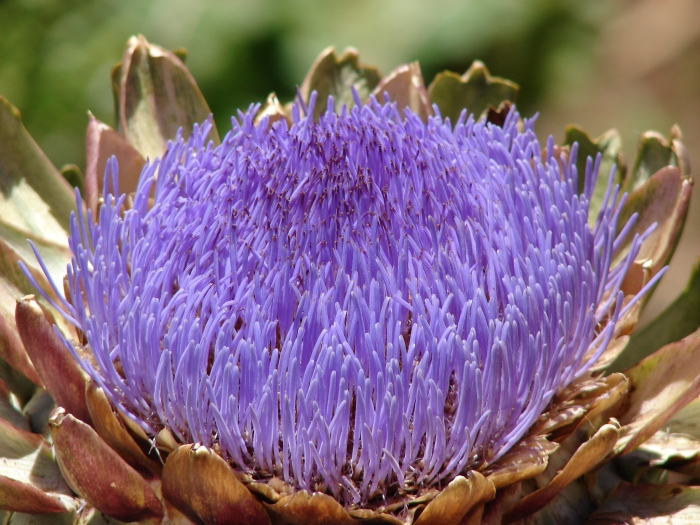Globe Artichoke
(Cynara scolymus)
Globe Artichoke (Cynara scolymus)
/
/

Forest and Kim Starr
CC BY 2.0
Image By:
Forest and Kim Starr
Recorded By:
Copyright:
CC BY 2.0
Copyright Notice:
Photo by: Forest and Kim Starr | License Type: CC BY 2.0 | License URL: https://creativecommons.org/licenses/by-sa/2.0/ | Uploader: Starr Environmental | Publisher: Flickr |





























Estimated Native Range
Summary
Cynara scolymus, commonly known as Globe Artichoke, is a perennial herb that is deciduous in colder climates. It is native to the Mediterranean region, where it thrives along riverbanks and in fields. This plant is a cultivated variety of a species of thistle and is grown primarily for its edible flower buds. Globe Artichokes can reach a height of 1.4–2 meters (4 feet 7 inches – 6 feet 7 inches) with a spread of up to 2 meters, featuring arching, deeply lobed, silvery, glaucous-green leaves that are 50–83 cm (19+1⁄2–32+1⁄2 inches) long. The plant’s striking appearance includes large, thistle-like flower heads that are harvested before blooming when they are most tender and edible. The flower heads are a deep green with a purple tinge and can be quite showy, adding ornamental value to the garden. The peak flowering season is in early summer, but the plant is grown for its immature buds.
Globe Artichokes are valued for their edible buds, which are considered a delicacy, and for their bold, architectural foliage that adds texture to garden beds and borders. They are commonly used in vegetable gardens and as ornamental features in landscape design. In cultivation, they require well-drained, fertile soil and consistent moisture. They are best grown in full sun but can tolerate light shade. Artichokes are typically propagated by rooted suckers and should be replaced every few years for optimal production. They are hardy in USDA zones 7 and above, with necessary frost protection in winter. Potential problems include artichoke plume moth and aphids, and they can suffer from root rot in poorly drained soils.CC BY-SA 4.0
Globe Artichokes are valued for their edible buds, which are considered a delicacy, and for their bold, architectural foliage that adds texture to garden beds and borders. They are commonly used in vegetable gardens and as ornamental features in landscape design. In cultivation, they require well-drained, fertile soil and consistent moisture. They are best grown in full sun but can tolerate light shade. Artichokes are typically propagated by rooted suckers and should be replaced every few years for optimal production. They are hardy in USDA zones 7 and above, with necessary frost protection in winter. Potential problems include artichoke plume moth and aphids, and they can suffer from root rot in poorly drained soils.CC BY-SA 4.0
Plant Description
- Plant Type: Herb
- Height: 3-4 feet
- Width: 6-8 feet
- Growth Rate: Moderate
- Flower Color: Purple
- Flowering Season: Summer
- Leaf Retention: Deciduous
Growth Requirements
- Sun: Full Sun
- Water: Medium
- Drainage: Medium
Common Uses
Bee Garden, Bird Garden, Border Plant, Butterfly Garden, Edible*Disclaimer: Easyscape's listed plant edibility is for informational use. Always verify the safety and proper identification of any plant before consumption., Hummingbird Garden
Natural Habitat
Native to riverbanks and fields in the Mediterranean region
Other Names
Common Names: French Artichoke, Green Artichoke, Artichoke, Artischocke, Garten-Artischocke
Scientific Names: , Cynara scolymus, Cynara cardunculus var. scolymus, Cynara cardunculus subsp. scolymus, Carduus scolymus, Cynara communis, Cynara esculenta, Cynara hortensis, Cynara scolymus var. redonensis,
GBIF Accepted Name: Cynara scolymus L.